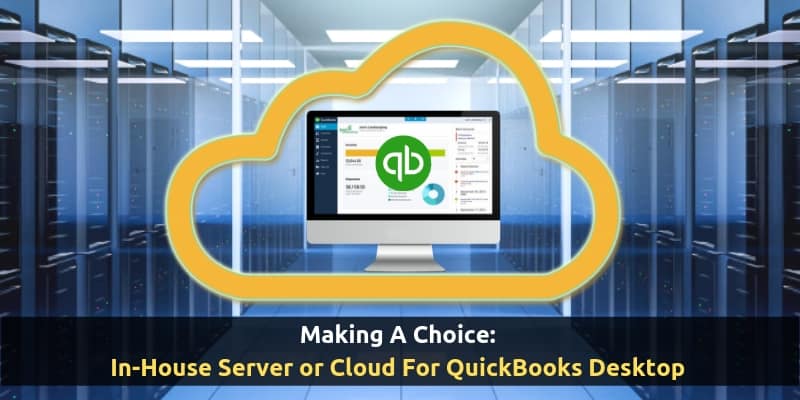
Making A Choice: In-House Server Or Cloud For QuickBooks Desktop
When it comes to migrating the QuickBooks desktop to the cloud, a lot of reasons inspire business owners. Whether it is cost efficiency, automated updates, ease of accessibility, or data security, both in-house server and the Cloud act as an upgrade over the desktop version. In recent years, a large number of businesses have shown interest in or embraced QuickBooks hosting. The rationale behind such a large volume of migration is simple- there are several issues that the users of QuickBooks desktop encounter at some point or the other which the cloud can resolve.
According to a recent survey, 45% of businesses that use QuickBooks Desktop host it on an in-house server, while 55% host it in the cloud. The survey also found that businesses that host QuickBooks Desktop in the cloud are more likely to be small businesses with fewer than 10 employees.
For instance, accidental deletion of data from the desktop can lead to permanent loss of critical business information. On the other hand, there can be hardware issues, on-premise theft or natural disasters such as floods and earthquakes that can cause perpetual damage to the business property. The cloud protects client data from issues like these. But, how can business owners and CPAs decide which cloud model is right for them? The choice between an in-house server vs cloud for hosting QuickBooks depends on factors such as budget, IT infrastructure, and specific business requirements.Let’s discuss.
Hosting QuickBooks: How To Decide Between An In-House Server and The Cloud?
There are two ways of taking your QuickBooks Desktop in the cloud- one, saving files and data on an in-house server and two, hosting the desktop software on the cloud. Both solutions come with their own set of benefits, some being mutual while others being completely unique. Entrepreneurs, CPAs, and individuals depending upon their distinctive business needs can make their choice between an on-premise server and a cloud hosting solution. However, the trick is to identify your personal requirements and then go forth with your decision.
On-Premise Server For Data Storage
If your plan is to just save your business data on the cloud storage, there are multiple players in the industry to choose from. Some of the most popular and secure cloud-storage providers are Amazon, Dropbox, and Google. Cloud storage is an economical solution, mainly for individuals and small businesses. Enterprises with their data stored in the cloud can easily enjoy device independence and freedom of access.
But, it also has its own restrictions. Cloud storage is particularly ideal for users who are only looking for a secure backup for their data. Those looking to collaborate and work on their files stored on the server will need to host their QuickBooks desktop application on the cloud.
QuickBooks Hosting For Advanced Features
Hosting QuickBooks on a cloud server is a more advanced solution compared to the previous one. The cloud services provider hosts the full feature-packed QuickBooks desktop on the cloud, so users can enjoy the complete attributes of the desktop software any time, anywhere. Cloud-based QuickBooks is also accessible on multiple devices, be it a smartphone, tablet, or desktop. Users do not need to install the application since it can be directly accessed via the cloud.
QuickBooks hosting can also be integrated with add-ons to make work more efficient and quick. Compared to cloud-storage, cloud hosting can cost a little more, but at the same time, it also eliminates the need to install an elaborate, in-house server, thus reducing the overall costs of cloud-migration. By carefully choosing the QuickBooks hosting provider, users can select one who offers a fairly flexible pricing scheme.
Storing one’s business data in the cloud or using QuickBooks hosting for the accounting needs, the utility is more or less the same. But there are some factors that may make one model a little more feasible over the other for a user. Following observations can help simplify decision making for individuals, CPAs, and business owners:
The Need To Hire A Team of Technicians
Since QuickBooks is mostly geared towards small businesses, individuals, and CPAs, hosting QuickBooks on a cloud server can prove to be a better option over the other. Since small businesses run on a smaller budget, they may lack the required human resource to set-up and manage an in-house server. The cloud hosting provider comes with all the necessary resources and can be easily afforded.
Budget Is Important To Consider
The budget is primary for anyone who decides to migrate to the cloud. Business owners who can afford an in-house cloud server can opt for one. Whereas, those with a narrow budget can simply opt for cloud hosting services which offer flexible pricing, up-to-date applications, and easy integration with add-ons.
The Need For Mobility
Data stored on the cloud can be accessed 24*7 but users cannot make changes or work in collaboration on those files. Whereas, QuickBooks hosting allows users to work on the stored data 24/7/365, on any device, and from any geographical location. So, those looking for mobility at work must go for Hosted QuickBooks rather than cloud storage.
Data Security Plays A Key Role
When it comes to data security, the cloud services providers perform multiple backups of their client’s data. This ensures that the data is never lost. In case the client accidentally deleted an important set of files from the office computer, they can be restored from the cloud, without downtime or technical glitches.
Need For Technical Support
Technical issues can pose themselves at any moment. With an on-premise server, owners need to train their staff and provide them the required technical know-how. But, with cloud-based QuickBooks, owners do not need to spend extra bucks on training and hiring trained staff. The QuickBooks hosting provider offers everything ready-to-use and offers round-the-clock technical support to their clients.
Wrapping Up
There is no one correct answer when businesses and individuals decide to make the move. The correct thing to do is to analyze and understand one’s personal needs and budget. If you only need to keep your data safe for future needs and you have ample funds, a private server is an answer. But, an accountant whose requirement is 24*7 availability and the ability to work-in-collaboration with one’s team and clients, QuickBooks on the cloud is the correct answer.








